BTEC HNC/D Healthcare Practice: Effective Reporting and Record Keeping
VerifiedAdded on 2023/01/05
|5
|828
|26
Report
AI Summary
This report delves into the critical aspects of reporting and record keeping within healthcare settings. It begins by outlining the statutory requirements, including the Data Protection Act, Human Rights Act, GDPR principles, and Freedom of Information, emphasizing the importance of patient confidentiality and data security. The report then explores the requirements of regulatory and inspecting bodies, such as the Care Quality Commission (CQC) and National Public Health England (NPHE), detailing their expectations for incident reporting and record maintenance. Furthermore, it highlights the implications of non-compliance with these regulations, including potential legal repercussions, financial penalties, and damage to the care setting's reputation. The report emphasizes the importance of accurate and consistent record keeping, ensuring the safety, health, and welfare of patients, and the overall quality of care provided.
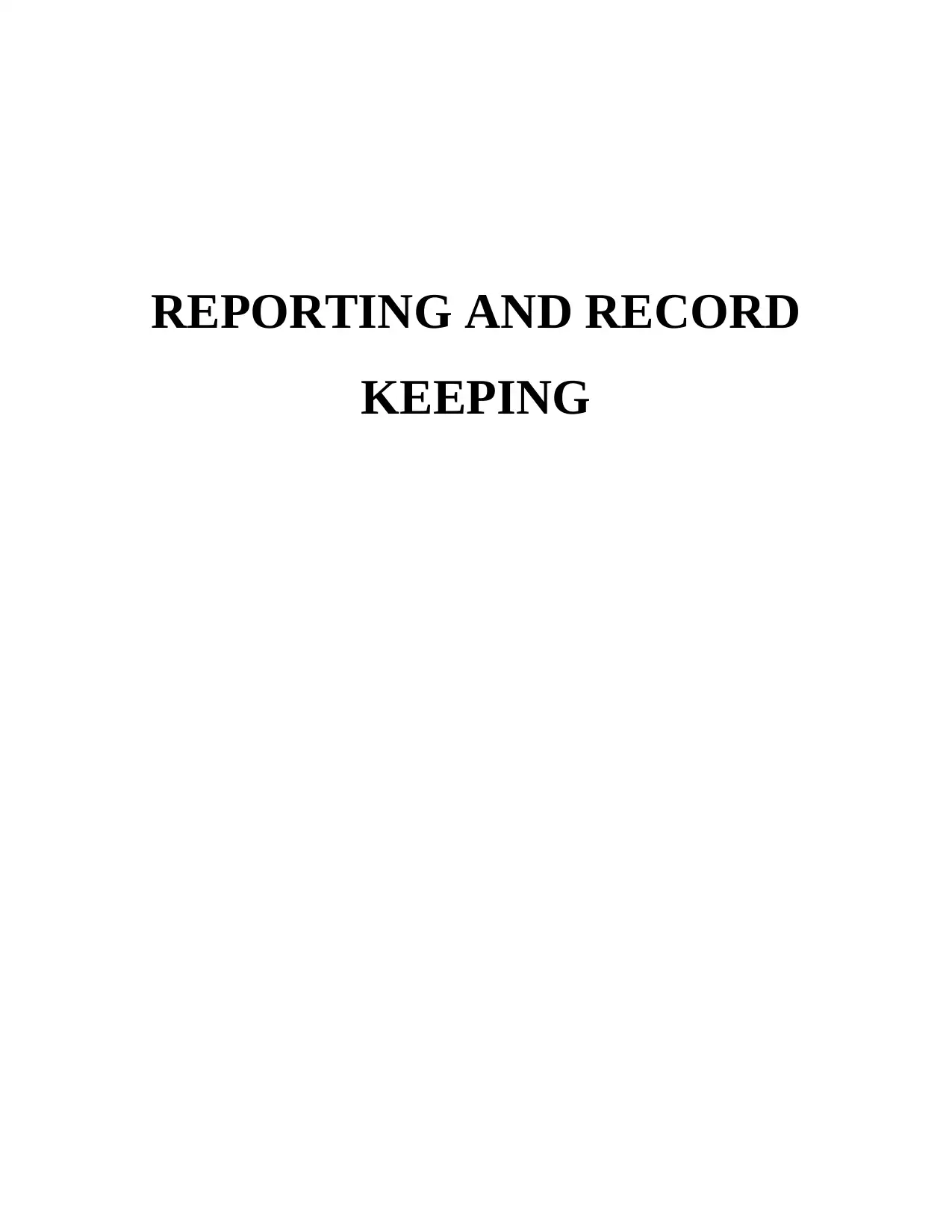
REPORTING AND RECORD
KEEPING
KEEPING
Paraphrase This Document
Need a fresh take? Get an instant paraphrase of this document with our AI Paraphraser
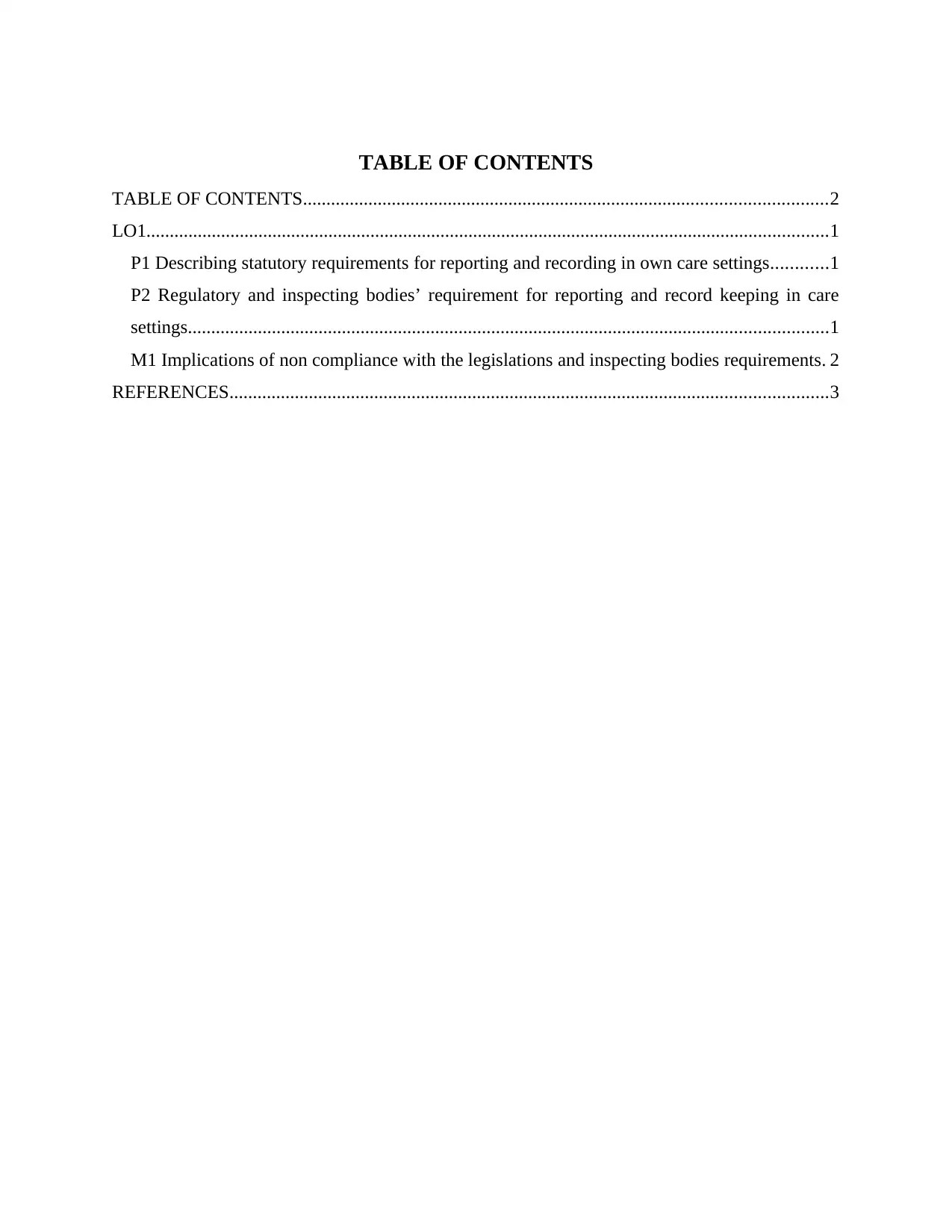
TABLE OF CONTENTS
TABLE OF CONTENTS................................................................................................................2
LO1..................................................................................................................................................1
P1 Describing statutory requirements for reporting and recording in own care settings............1
P2 Regulatory and inspecting bodies’ requirement for reporting and record keeping in care
settings.........................................................................................................................................1
M1 Implications of non compliance with the legislations and inspecting bodies requirements. 2
REFERENCES................................................................................................................................3
TABLE OF CONTENTS................................................................................................................2
LO1..................................................................................................................................................1
P1 Describing statutory requirements for reporting and recording in own care settings............1
P2 Regulatory and inspecting bodies’ requirement for reporting and record keeping in care
settings.........................................................................................................................................1
M1 Implications of non compliance with the legislations and inspecting bodies requirements. 2
REFERENCES................................................................................................................................3
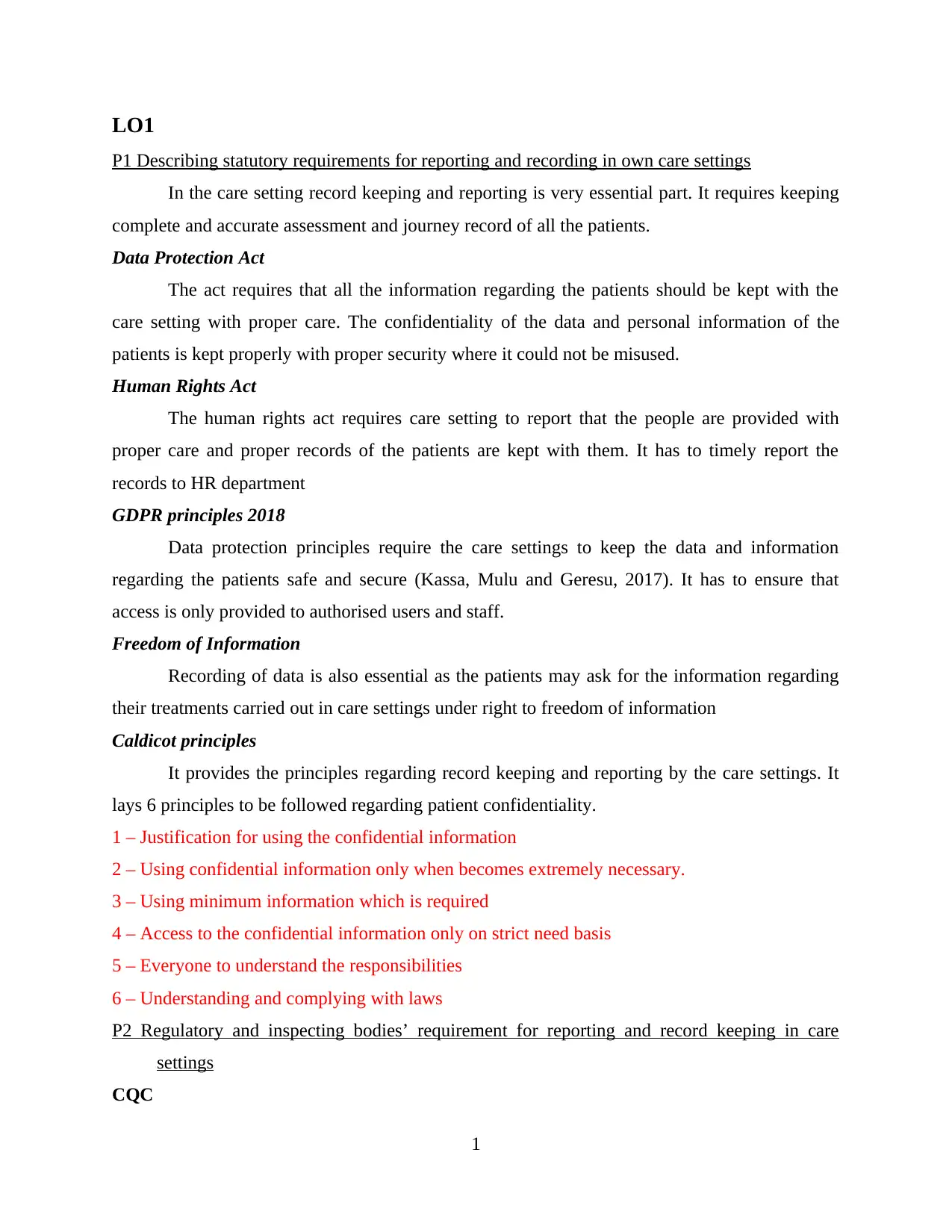
LO1
P1 Describing statutory requirements for reporting and recording in own care settings
In the care setting record keeping and reporting is very essential part. It requires keeping
complete and accurate assessment and journey record of all the patients.
Data Protection Act
The act requires that all the information regarding the patients should be kept with the
care setting with proper care. The confidentiality of the data and personal information of the
patients is kept properly with proper security where it could not be misused.
Human Rights Act
The human rights act requires care setting to report that the people are provided with
proper care and proper records of the patients are kept with them. It has to timely report the
records to HR department
GDPR principles 2018
Data protection principles require the care settings to keep the data and information
regarding the patients safe and secure (Kassa, Mulu and Geresu, 2017). It has to ensure that
access is only provided to authorised users and staff.
Freedom of Information
Recording of data is also essential as the patients may ask for the information regarding
their treatments carried out in care settings under right to freedom of information
Caldicot principles
It provides the principles regarding record keeping and reporting by the care settings. It
lays 6 principles to be followed regarding patient confidentiality.
1 – Justification for using the confidential information
2 – Using confidential information only when becomes extremely necessary.
3 – Using minimum information which is required
4 – Access to the confidential information only on strict need basis
5 – Everyone to understand the responsibilities
6 – Understanding and complying with laws
P2 Regulatory and inspecting bodies’ requirement for reporting and record keeping in care
settings
CQC
1
P1 Describing statutory requirements for reporting and recording in own care settings
In the care setting record keeping and reporting is very essential part. It requires keeping
complete and accurate assessment and journey record of all the patients.
Data Protection Act
The act requires that all the information regarding the patients should be kept with the
care setting with proper care. The confidentiality of the data and personal information of the
patients is kept properly with proper security where it could not be misused.
Human Rights Act
The human rights act requires care setting to report that the people are provided with
proper care and proper records of the patients are kept with them. It has to timely report the
records to HR department
GDPR principles 2018
Data protection principles require the care settings to keep the data and information
regarding the patients safe and secure (Kassa, Mulu and Geresu, 2017). It has to ensure that
access is only provided to authorised users and staff.
Freedom of Information
Recording of data is also essential as the patients may ask for the information regarding
their treatments carried out in care settings under right to freedom of information
Caldicot principles
It provides the principles regarding record keeping and reporting by the care settings. It
lays 6 principles to be followed regarding patient confidentiality.
1 – Justification for using the confidential information
2 – Using confidential information only when becomes extremely necessary.
3 – Using minimum information which is required
4 – Access to the confidential information only on strict need basis
5 – Everyone to understand the responsibilities
6 – Understanding and complying with laws
P2 Regulatory and inspecting bodies’ requirement for reporting and record keeping in care
settings
CQC
1
⊘ This is a preview!⊘
Do you want full access?
Subscribe today to unlock all pages.

Trusted by 1+ million students worldwide
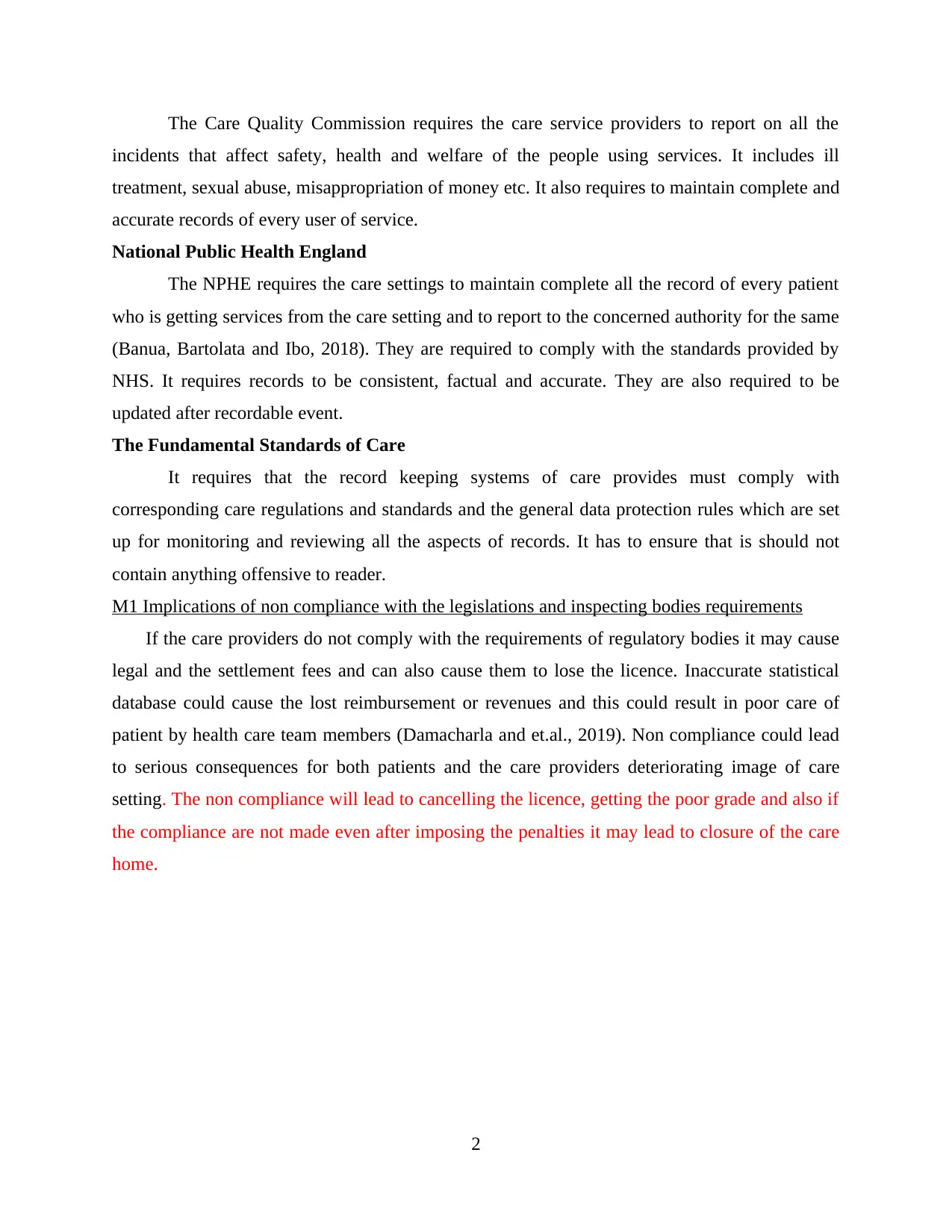
The Care Quality Commission requires the care service providers to report on all the
incidents that affect safety, health and welfare of the people using services. It includes ill
treatment, sexual abuse, misappropriation of money etc. It also requires to maintain complete and
accurate records of every user of service.
National Public Health England
The NPHE requires the care settings to maintain complete all the record of every patient
who is getting services from the care setting and to report to the concerned authority for the same
(Banua, Bartolata and Ibo, 2018). They are required to comply with the standards provided by
NHS. It requires records to be consistent, factual and accurate. They are also required to be
updated after recordable event.
The Fundamental Standards of Care
It requires that the record keeping systems of care provides must comply with
corresponding care regulations and standards and the general data protection rules which are set
up for monitoring and reviewing all the aspects of records. It has to ensure that is should not
contain anything offensive to reader.
M1 Implications of non compliance with the legislations and inspecting bodies requirements
If the care providers do not comply with the requirements of regulatory bodies it may cause
legal and the settlement fees and can also cause them to lose the licence. Inaccurate statistical
database could cause the lost reimbursement or revenues and this could result in poor care of
patient by health care team members (Damacharla and et.al., 2019). Non compliance could lead
to serious consequences for both patients and the care providers deteriorating image of care
setting. The non compliance will lead to cancelling the licence, getting the poor grade and also if
the compliance are not made even after imposing the penalties it may lead to closure of the care
home.
2
incidents that affect safety, health and welfare of the people using services. It includes ill
treatment, sexual abuse, misappropriation of money etc. It also requires to maintain complete and
accurate records of every user of service.
National Public Health England
The NPHE requires the care settings to maintain complete all the record of every patient
who is getting services from the care setting and to report to the concerned authority for the same
(Banua, Bartolata and Ibo, 2018). They are required to comply with the standards provided by
NHS. It requires records to be consistent, factual and accurate. They are also required to be
updated after recordable event.
The Fundamental Standards of Care
It requires that the record keeping systems of care provides must comply with
corresponding care regulations and standards and the general data protection rules which are set
up for monitoring and reviewing all the aspects of records. It has to ensure that is should not
contain anything offensive to reader.
M1 Implications of non compliance with the legislations and inspecting bodies requirements
If the care providers do not comply with the requirements of regulatory bodies it may cause
legal and the settlement fees and can also cause them to lose the licence. Inaccurate statistical
database could cause the lost reimbursement or revenues and this could result in poor care of
patient by health care team members (Damacharla and et.al., 2019). Non compliance could lead
to serious consequences for both patients and the care providers deteriorating image of care
setting. The non compliance will lead to cancelling the licence, getting the poor grade and also if
the compliance are not made even after imposing the penalties it may lead to closure of the care
home.
2
Paraphrase This Document
Need a fresh take? Get an instant paraphrase of this document with our AI Paraphraser
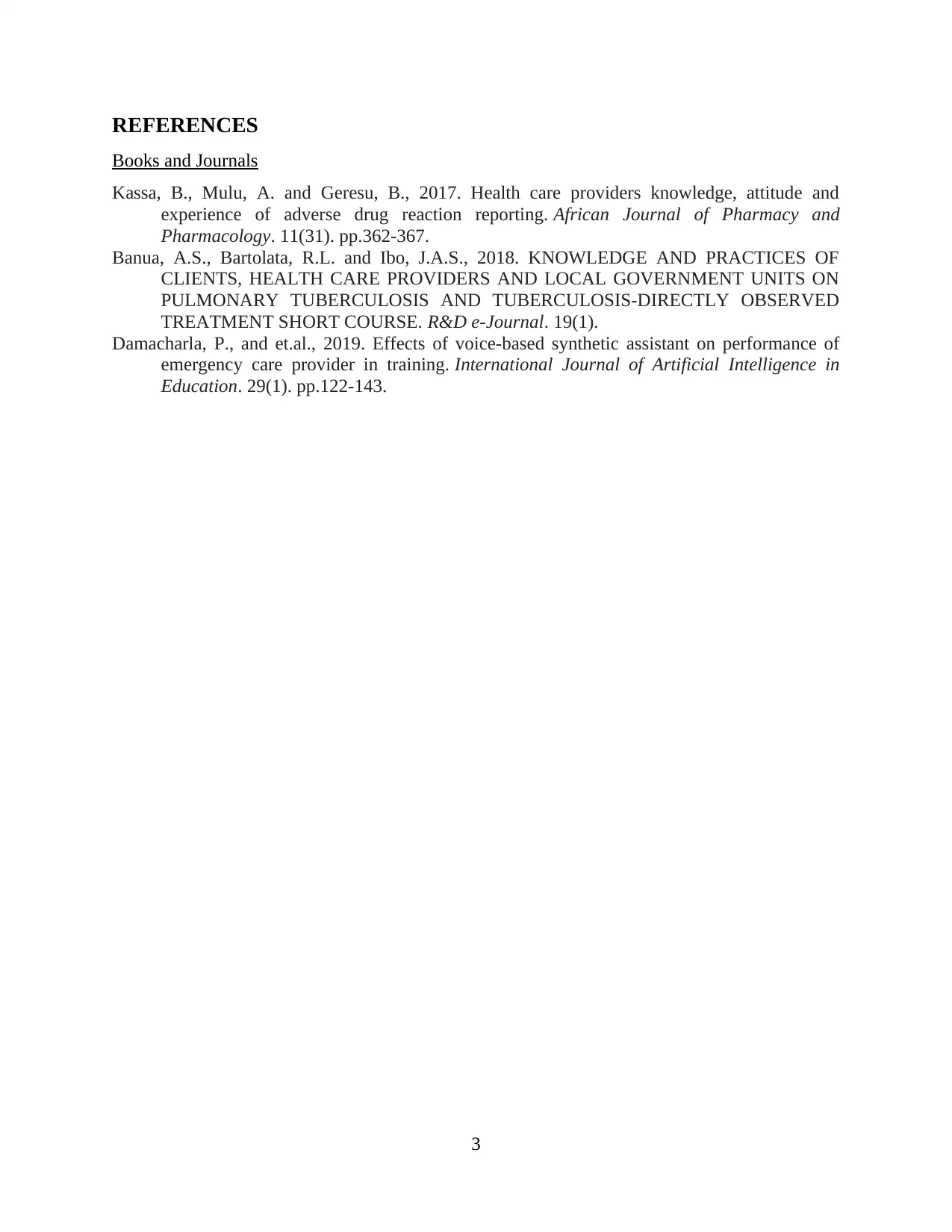
REFERENCES
Books and Journals
Kassa, B., Mulu, A. and Geresu, B., 2017. Health care providers knowledge, attitude and
experience of adverse drug reaction reporting. African Journal of Pharmacy and
Pharmacology. 11(31). pp.362-367.
Banua, A.S., Bartolata, R.L. and Ibo, J.A.S., 2018. KNOWLEDGE AND PRACTICES OF
CLIENTS, HEALTH CARE PROVIDERS AND LOCAL GOVERNMENT UNITS ON
PULMONARY TUBERCULOSIS AND TUBERCULOSIS-DIRECTLY OBSERVED
TREATMENT SHORT COURSE. R&D e-Journal. 19(1).
Damacharla, P., and et.al., 2019. Effects of voice-based synthetic assistant on performance of
emergency care provider in training. International Journal of Artificial Intelligence in
Education. 29(1). pp.122-143.
3
Books and Journals
Kassa, B., Mulu, A. and Geresu, B., 2017. Health care providers knowledge, attitude and
experience of adverse drug reaction reporting. African Journal of Pharmacy and
Pharmacology. 11(31). pp.362-367.
Banua, A.S., Bartolata, R.L. and Ibo, J.A.S., 2018. KNOWLEDGE AND PRACTICES OF
CLIENTS, HEALTH CARE PROVIDERS AND LOCAL GOVERNMENT UNITS ON
PULMONARY TUBERCULOSIS AND TUBERCULOSIS-DIRECTLY OBSERVED
TREATMENT SHORT COURSE. R&D e-Journal. 19(1).
Damacharla, P., and et.al., 2019. Effects of voice-based synthetic assistant on performance of
emergency care provider in training. International Journal of Artificial Intelligence in
Education. 29(1). pp.122-143.
3
1 out of 5
Related Documents
Your All-in-One AI-Powered Toolkit for Academic Success.
+13062052269
info@desklib.com
Available 24*7 on WhatsApp / Email
![[object Object]](/_next/static/media/star-bottom.7253800d.svg)
Unlock your academic potential
Copyright © 2020–2026 A2Z Services. All Rights Reserved. Developed and managed by ZUCOL.





